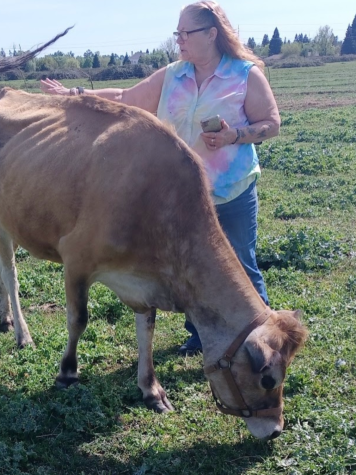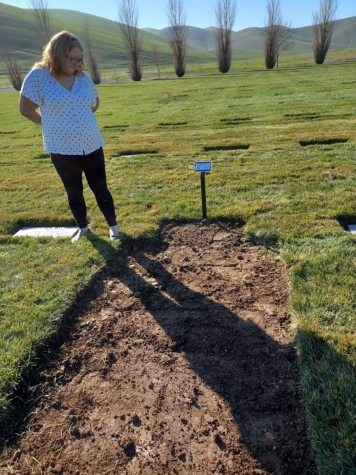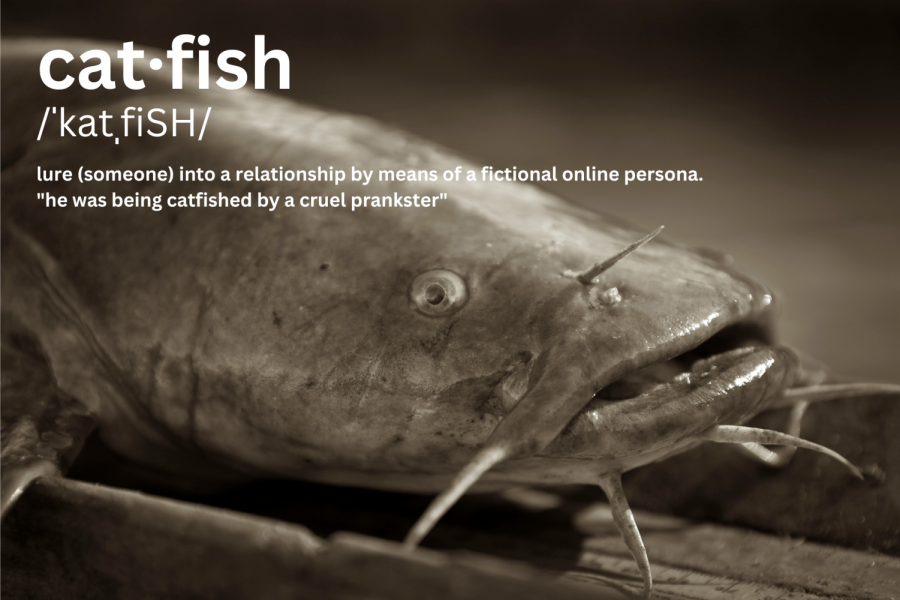On The Hook
A deep look into the world of catfishing and its victims
Cat·fish
/ˈkatˌfiSH/
INFORMAL•US
Lure (someone) into a relationship by means of a fictional online persona
“Mary DiCarlo was being catfished for the second time.”
She wants to go on cruises with her boyfriend. She wants to visit Mexico, to meet his family. She wants to visit Ohio, to have him meet hers. She won’t take him up on his offer to buy her a car, “‘Any car your heart desires!’” Her Subaru works just fine. She hopes he won’t die any time soon, because she’s already fallen in love with him. She’s not eager for a repeat of her last marriage, which ended a few years ago when Gary passed away. She says she’s tired of playing the nurse for everyone in her life. She finds patients wherever she goes.

Mary DiCarlo has 11 grandchildren. She can remember three of their names. As she takes a moment to search for the other eight, her eyes run back and forth over the aisles and walkways of the Jolly Giant Flea Market where she sets up shop once or twice a week. The market is a large warehouse, in the back of which is a recycling plant. Stacks of large plastic-filled cubes line the walls and corners of the building. The overhead lights in these areas are shut off. Most of the lights are shut off, and sunlight illuminates few of the vendors’ tables where the electric fails. Though many of the shops in the market are squeezed next to each other within the walls of the building, one strip of walkway along the parking lot is wide enough for folding tables and narrow shuffling. DiCarlo sets up her table on this walkway, hauling her wares from her mobile-home to the flea market dropoff every weekend.
DiCarlo has two children, three, counting her step-daughter from her second marriage. They do not live near her. Her daughter, Linda, she had with her high school sweetheart, Brian, when she was 18. She married him only when her mother made her swear to do so. Later, they had Christopher. Ultimately, however, she ended up raising the children on her own. No child support, or anything else. She repeats this three times.
Though Lisa Martin, a vendor at Jolly Giant and DiCarlo’s friend, would argue that DiCarlo gravitates toward situations in which people must rely solely on her, that she hates to be alone.
Those who speak of DiCarlo, even lovingly, do so with an ice in their voice and a roll in their eyes that does not lend itself to friendship. Every kind word has a bitter after-taste of agitation, like one speaks of a coddling mother.
“Very, very touchy-feely,” Jonathan McNeely, a fellow vendor and acquaintance of DiCarlo, says with a small grimace.
Love and resentment weave themselves around DiCarlo’s ankles like clingy housecats, tripping her up throughout the day. Maybe this is why she still needs the cane that Gary left behind when he died.
Counting her children and those she tended to outside of her immediate family, DiCarlo has spent most of her life living others’ lives with them, and less time experiencing her own. She rattles off ailments that have plagued her brothers, sister-in-law, mother, husband and children, almost like a list of accomplishments of her life. She smiles, her crooked jaw, which she says is a result of one of her father’s blows when she was younger, tilts her lips down to the right. This story is fleeting, though, relative to her interest in those around her.
DiCarlo’s gray hair has streaks of a lighter brown in it, but mostly matches the outside of her mobile home which she shared with her husband before he died. Two small dogs bark from within. Martin visits when she can.
“She’s like somebody you would see in an old film,” Martin explains with a laugh. “She’s the middle-aged busybody, kind of.”
The two have been friends “on and off” as Martin describes it, for the last six years, though the relationship remains strong.
“I would certainly be there if she needed me,” she says.
These relationships are common in DiCarlo’s life, according to Martin; strong connections with little foundation. She embraces everyone she meets in a two-armed hug, every time, kissing their cheek as she does. She calls her friends “love,” and strangers “honey.” She refers to every man in the flea market as her husband, and encourages vulnerability using stories of her life. Before long, Martin, a tall woman with fair skin and beet-red cheeks, had a detailed understanding of DiCarlo’s children, her past husbands, her family, without much context for any of it. DiCarlo takes her time, however, getting around to talking about her mother.
It is only then that DiCarlo’s stories start to seem more tethered to reality, rather than anecdotes, or off-handed tragedies peppered-in to add color to the novel she makes her life out to be. She recounts her abusive second husband and her brother’s passing with a detached calmness, as if she’s reading a sad news article. She’s affected by the information, but it isn’t in front of her long. To hear her speak of her mother’s last days, however, is heavy, saturated.
“My mother lost so much weight,” she explains. Her voice wavers and begins to crack. “She only weighed 87 pounds when she died. And I used to have to pull her skin away from her bones to give her morphine shots.”
By seeing her mother through her battle with cancer, DiCarlo cements her role in her own mind as a caregiver. Though she sinks away from the memory as she recounts it, the conclusion straightens her again.
“And I could do it because it helped her.”
DiCarlo loved Gary, too, “if you want to call it that,” she clarified. One of her brothers had long passed, leaving his widow, Pat, to remarry a man named Gary. As a final promise to Pat before she died, DiCarlo swore she would take care of her former sister-in-law’s husband. The two married shortly after Pat’s funeral. She explains that they grew to love each other very much, though the tears brought on by her mother’s memory quickly dry up as she mentions her late husband.

“Promises were always broken when I was a kid, so a promise from me is my word,” DiCarlo said.
For the second time in her life, DiCarlo entered a marriage as an obligation to someone else. Since Gary’s death, she tentatively takes the reigns of her own life for the first time.
“He would never, ever change this house,” DiCarlo says. “It was set up the way his wife- and I still call her his wife, my sister-in-law- the way his wife had set up, I was not allowed to change it.”
DiCarlo speaks about this new chapter with a coy, secretive tone. She’s intentionally vague about the men she’s met, and the nature of her interactions with them. She only discloses enough to keep herself interested.
DiCarlo’s daughter, Linda, and DiCarlo’s friends, knew the signs of a catfish, someone who uses the cloak of the internet to pretend to be someone they aren’t and swindle money or attention from unsuspecting folks in the process. Psychology Today describes someone making “excuse after excuse for not meeting up in person” as a red flag that might be an indicator of a catfish. When DiCarlo’s new, wealthy, handsome boyfriend, Fred, could never visit her because he was working on an oil rig off the coast of Aruba, those in her support system were suspicious. When the man began requesting cash and her social security number, they were exasperated.
“Mary was abysmally lonely,” Martin remembers of DiCarlo’s husband passing. “Her daughter was worried about it; I was worried about it. Partly because she was obviously very unhappy and partly because it gets exhausting consoling someone who will not do anything to alleviate their discomfort.”
Martin offers this along with a sheepish chuckle as an explanation for urging her friend to begin online dating. However, the questionable nature of DiCarlo’s new relationship prompted Martin to look into him further. With Martin’s help, DiCarlo confronted Fred, who admitted to lying. She still keeps in touch with him.
Christian, however, according to DiCarlo, lives nearby. He currently is staying in West Virginia while he settles his father’s estate. DiCarlo met him through FacebookDating. According to screenandreveal.com, Facebook has removed 1.3 billion false accounts since mid-2021. Despite the mistakes she’s made in the past regarding romance, she dreams wistfully about the memories she and Christian intend to make together. Once the IRS unfreezes his assets, and he sells his father’s estate, she explains, laughing, they’ll have money to spare. DiCarlo shuts out the warnings of her friends and family and thinks of travel and good food—she emphasizes her cruise fantasy.
Martin and Linda share skepticism about Christian’s character.
“Both Mary’s daughter and I noticed that when he left recorded voice messages—. He claims to be from Mexico, but the accent he has is South African,” Martin explained. “And I don’t really know Mary’s daughter at all, but we both noticed it independently.”
DiCarlo, for herself, doesn’t seem to mind much when people reveal themselves to be untrue. It has been six months since she discovered Fred’s real motives. She believes him when he assures her that he sincerely fell in love, despite the fraud. She doesn’t mind when Martin warns her about Christian, either. Though she has no one tangible to care for these days, she still seeks relationships with people who need her, either emotionally, physically or financially. Despite having her time to herself again, she still spends it musing about the life she will have, rather than she one she does.
Incidences of catfishing rose dramatically during the pandemic. According to a public service announcement on the FBI’s website, from January 1 to July 31 of 2021, their complaint center received 1,800 complaints related to “online romance scams,” resulting in losses of over $133,400,000 across the United States. Psychology Today and many other sites that touch on the subject warn that catfishers deliberately prey on those they deem are easily inclined to romantic relationships. “Abysmally lonely” fits the M.O. perfectly.
The path in front of DiCarlo, she knows, is bright. She puts all of her energy into picturing it in the perfect light. She could prove everyone around her wrong. Christian might come back. He might have money. They might meet each other’s families. One thing is certain, however.
“We’re not going to go on a cruise,” DiCarlo explains. “He doesn’t like the water.”



